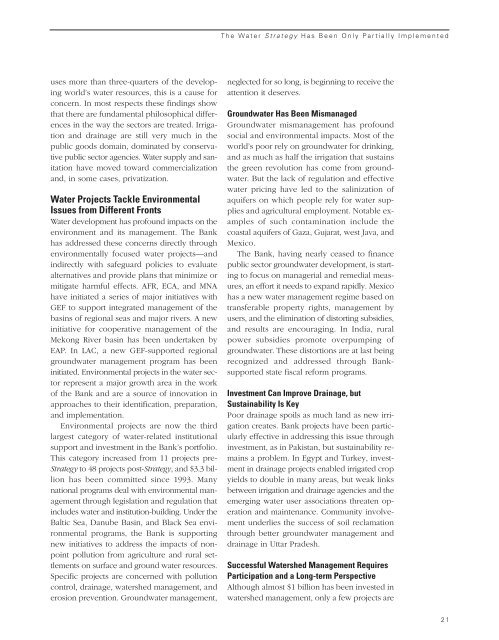Download Report - Independent Evaluation Group - World Bank
Download Report - Independent Evaluation Group - World Bank
Download Report - Independent Evaluation Group - World Bank
You also want an ePaper? Increase the reach of your titles
YUMPU automatically turns print PDFs into web optimized ePapers that Google loves.
The Water Strategy Has Been Only Partially Implementeduses more than three-quarters of the developingworld’s water resources, this is a cause forconcern. In most respects these findings showthat there are fundamental philosophical differencesin the way the sectors are treated. Irrigationand drainage are still very much in thepublic goods domain, dominated by conservativepublic sector agencies. Water supply and sanitationhave moved toward commercializationand, in some cases, privatization.Water Projects Tackle EnvironmentalIssues from Different FrontsWater development has profound impacts on theenvironment and its management. The <strong>Bank</strong>has addressed these concerns directly throughenvironmentally focused water projects—andindirectly with safeguard policies to evaluatealternatives and provide plans that minimize ormitigate harmful effects. AFR, ECA, and MNAhave initiated a series of major initiatives withGEF to support integrated management of thebasins of regional seas and major rivers. A newinitiative for cooperative management of theMekong River basin has been undertaken byEAP. In LAC, a new GEF-supported regionalgroundwater management program has beeninitiated. Environmental projects in the water sectorrepresent a major growth area in the workof the <strong>Bank</strong> and are a source of innovation inapproaches to their identification, preparation,and implementation.Environmental projects are now the thirdlargest category of water-related institutionalsupport and investment in the <strong>Bank</strong>’s portfolio.This category increased from 11 projects pre-Strategy to 48 projects post-Strategy, and $3.3 billionhas been committed since 1993. Manynational programs deal with environmental managementthrough legislation and regulation thatincludes water and institution-building. Under theBaltic Sea, Danube Basin, and Black Sea environmentalprograms, the <strong>Bank</strong> is supportingnew initiatives to address the impacts of nonpointpollution from agriculture and rural settlementson surface and ground water resources.Specific projects are concerned with pollutioncontrol, drainage, watershed management, anderosion prevention. Groundwater management,neglected for so long, is beginning to receive theattention it deserves.Groundwater Has Been MismanagedGroundwater mismanagement has profoundsocial and environmental impacts. Most of theworld’s poor rely on groundwater for drinking,and as much as half the irrigation that sustainsthe green revolution has come from groundwater.But the lack of regulation and effectivewater pricing have led to the salinization ofaquifers on which people rely for water suppliesand agricultural employment. Notable examplesof such contamination include thecoastal aquifers of Gaza, Gujarat, west Java, andMexico.The <strong>Bank</strong>, having nearly ceased to financepublic sector groundwater development, is startingto focus on managerial and remedial measures,an effort it needs to expand rapidly. Mexicohas a new water management regime based ontransferable property rights, management byusers, and the elimination of distorting subsidies,and results are encouraging. In India, ruralpower subsidies promote overpumping ofgroundwater. These distortions are at last beingrecognized and addressed through <strong>Bank</strong>supportedstate fiscal reform programs.Investment Can Improve Drainage, butSustainability Is KeyPoor drainage spoils as much land as new irrigationcreates. <strong>Bank</strong> projects have been particularlyeffective in addressing this issue throughinvestment, as in Pakistan, but sustainability remainsa problem. In Egypt and Turkey, investmentin drainage projects enabled irrigated cropyields to double in many areas, but weak linksbetween irrigation and drainage agencies and theemerging water user associations threaten operationand maintenance. Community involvementunderlies the success of soil reclamationthrough better groundwater management anddrainage in Uttar Pradesh.Successful Watershed Management RequiresParticipation and a Long-term PerspectiveAlthough almost $1 billion has been invested inwatershed management, only a few projects are21
















